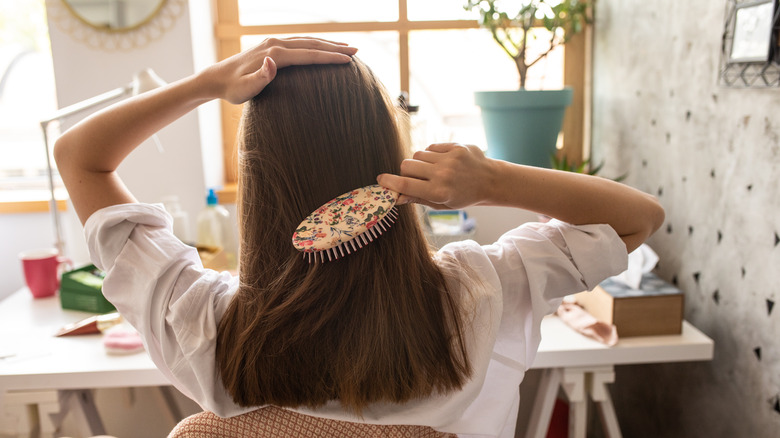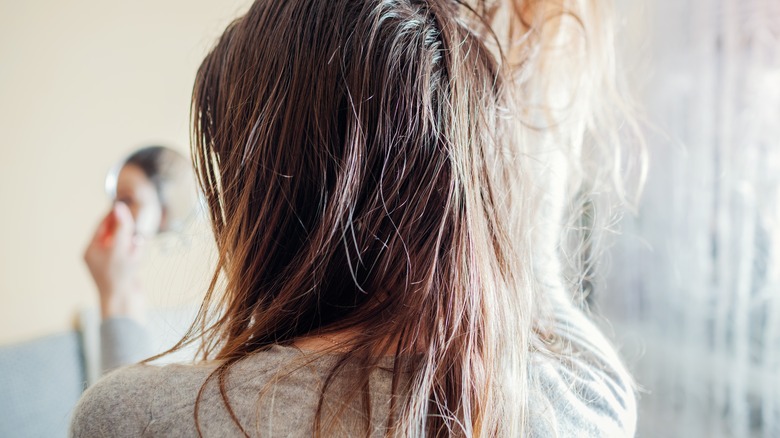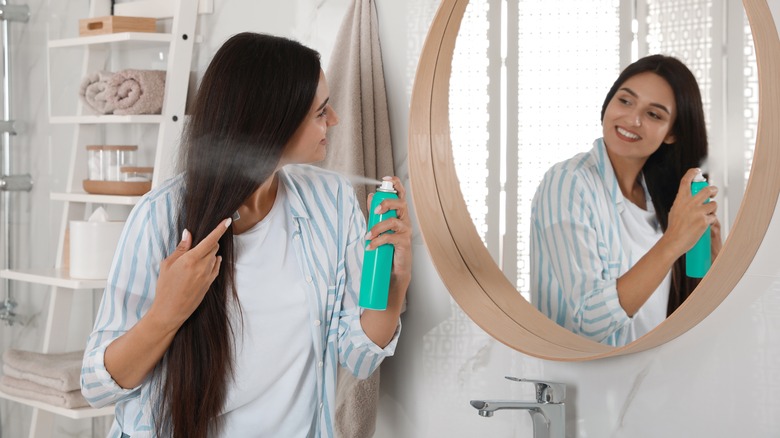What Is 'Period Hair' And How Can You Manage It?
Hair means a lot to many people and is a unique form of self-expression. On an evolutionary level, hair is significant to us because it's a sense organ, regulates body temperature, and helps us attract mates, according to a 2023 article published in StatPearls. It's no surprise, then, that having a bad hair day can leave us feeling discouraged and less confident. For some women, bad hair days are more common around their monthly period, according to a menstrual cycle tracker app called Clue. On the app, women record their hair days as good, bad, oily, or dry.
During a period, hormonal changes in the body can trigger what is affectionately called "period hair." To make sense of these changes and find ways to manage them, it can be useful to know a bit of background on hair anatomy. According to Medscape, individual hairs grow out of hair follicles that are connected to the arrector pili muscle and sebaceous gland ducts. The small hairs that stand up when you get goosebumps are triggered by the arrector pili muscle, as described by the University of Leeds. Meanwhile, sebum oil is released into the hair by the sebaceous gland ducts.
Hormonal fluctuations during a period can contribute to changes in the hair, including increased oil production, dryness, and hair loss. However, there are options available to help your hair stay healthy if period hair is a problem in your life.
How your period can affect your hair
You know how frustrating it can feel if you've ever experienced oily hair that won't subside after a thorough wash. On top of cramps and headaches, oily hair can add to the stress of a period.
Testosterone levels are at their peak during a period, as explained by Women's Health. Androgens, a type of testosterone, are the primary hormones responsible for sebum production, as described by Clue. During a period, excess sebum from the sebaceous gland ducts can make hair more oily. Progesterone levels rise a week before a period starts and increase sebum production on the scalp. According to HealthShots, women with an overactive sebaceous gland or polycystic ovary syndrome (PCOS) can have oily hair during their period. On the other hand, some women may find that their hair and skin become more dry around their period, as pointed out by Viva Eve.
In some cases, the hormonal fluctuations of a period can contribute to hair loss. A type of hair loss called telogen effluvium may occur during menstruation due to the sudden increase in progesterone and decrease in estrogen in the body, according to Longevita. As explained by Monpure, this type of hair loss is temporary and typically regrows. The overproduction of sebum during menstruation can clog pores and lead to itchiness on the scalp. Women with PCOS may experience heavy periods and hair loss due to high androgen levels in the body.
How to manage your period hair
Having period hair isn't fun. Luckily, there are ways you can care for your hair so it can feel its best, even during your period. When experiencing oily hair, dry shampoo is the holy grail for temporarily masking excess sebum, as described by Healthline. It's recommended to use dry shampoo sparingly, as it can dry out your hair. But if you're on your period and want to freshen up your oily hair quickly, you might find dry shampoo useful.
Another method you can use sparingly is clarifying shampoo. According to Healthline, clarifying shampoo can also dry out hair if used too often, but it can be effective for occasionally cleaning off buildup on the scalp. Dr. Kuna Ramdas, a senior dermatologist at Kamineni Hospitals, Hyderabad, told HealthShots that clarifying shampoo can be used once a week, and a sulfate-free shampoo and conditioner should be used the rest of the time. Shampoos containing tea tree oil and green tea may reduce excess oil in the hair. You can also create a consistent hair-washing schedule and take good care of yourself by eating well and staying hydrated. Try to avoid touching your hair often since that can make it dirty faster.
Women struggling with hair loss during their periods should consult with a doctor who can diagnose the underlying cause, as noted by Longevita. A medication called minoxidil and platelet-rich plasma (PRP) injections can be helpful for some women experiencing hair loss during their period.



